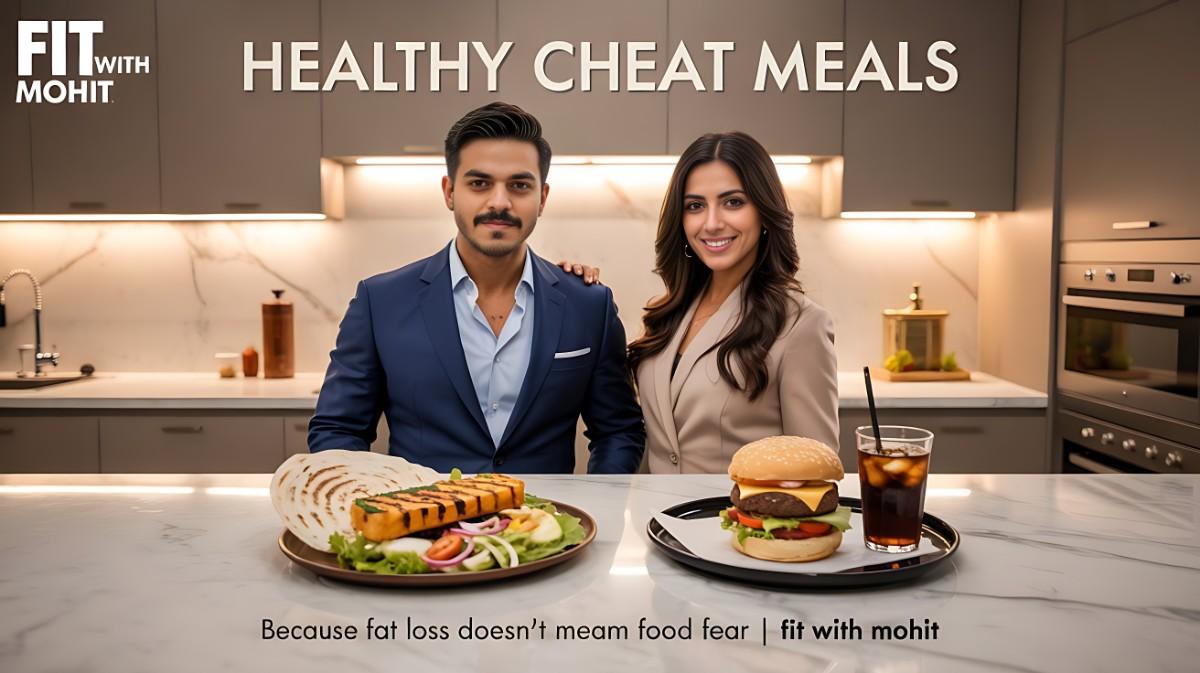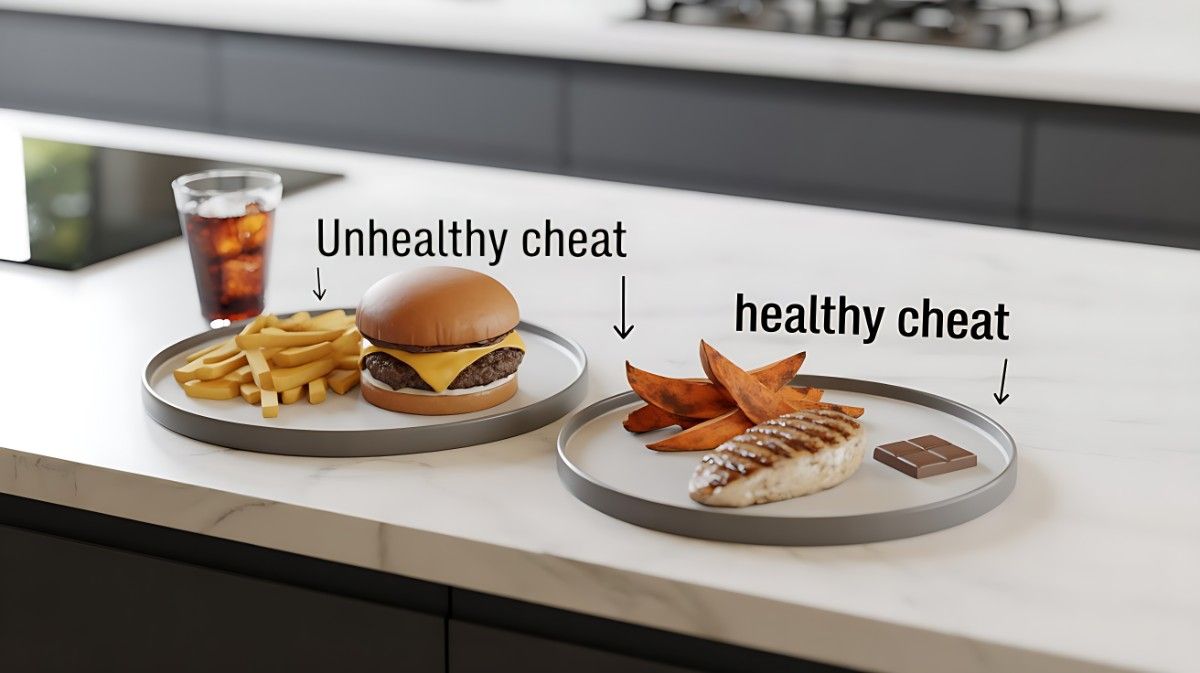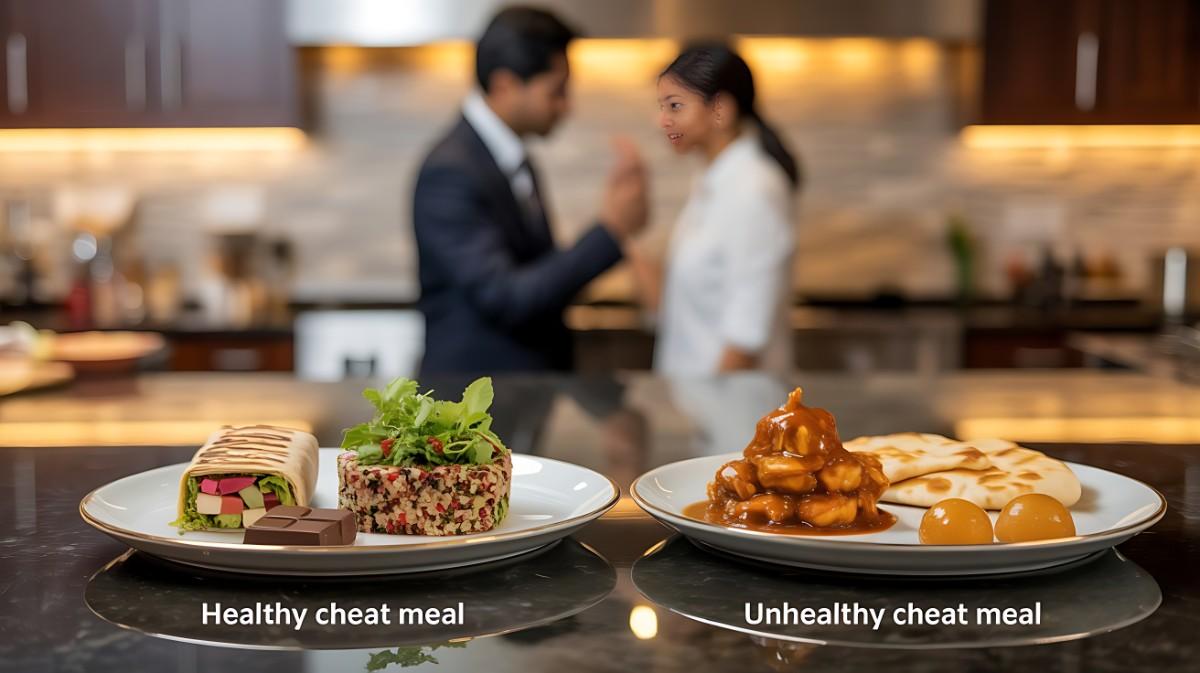Healthy Cheat Meals

Can You Really Lose Weight While Eating Healthy Cheat Meals?
Let’s be honest—nobody wants to live on boiled veggies and protein shakes forever. If you’ve been avoiding your favorite foods out of guilt, this blog will change your perspective. When done right, healthy cheat meals can actually boost your weight loss journey, mentally and physically. As a diet coach who has helped over 500 people transform their health, I’ve seen firsthand how structured flexibility like this increases consistency, motivation, and results.
Written by Mohit Verma, Diet Coach & Founder of Fit with Mohit.
What Are Cheat Meals and How Do They Work?

What Makes Healthy Cheat Meals Different from Binge Eating?
A healthy cheat meal is not a free-for-all. It’s a planned, portion-controlled indulgence that allows you to enjoy your favorite dish—like a burger, biryani, or dessert—without falling off track. Unlike binge eating, cheat meals are part of a system, not an emotional reaction.
Psychological Power of Healthy Cheat Meals
Ever felt deprived on a diet? That’s exactly why healthy cheat meals work—they give your brain a break. By including a guilt-free indulgence once a week, you stop seeing food as the enemy. This relieves mental pressure and boosts your willpower to stick with your routine the rest of the time.
The Role of Healthy Cheat Meals in Calorie Cycling
When you’re on a fat loss plan, your metabolism can slow down after weeks of being in a calorie deficit. A cheat meal, especially carb-rich, can temporarily spike leptin levels, boost energy, and restore glycogen, keeping your metabolism firing. Healthy cheat meals are like a quick pit stop in your fat loss race—they recharge you without making you lose pace.
Psychological & Physiological Effects of Cheat Meals

The Mental Relief of a Well-Planned Cheat Meal
Diet fatigue is real. Constant restriction can cause cravings to spiral. A well-timed cheat meal offers mental relief and emotional satisfaction, making your journey more sustainable. You’ll bounce back stronger and more motivated.
The Hormonal Boost – Leptin, Ghrelin & Metabolism Explained
During calorie restriction, leptin (fullness hormone) drops, and ghrelin (hunger hormone) spikes. A healthy cheat meal helps rebalance these hunger hormones, supporting appetite regulation and even improving fat-burning potential.
Are You Craving or Are You Emotionally Eating?
There’s a fine line between needing a cheat meal and giving in to emotional eating. Before indulging, ask: “Am I truly hungry or just stressed?” Healthy cheat meals should be intentional—not impulsive. Mindful planning is the secret sauce.
What Does Science Say About Cheat Meals and Fat Loss?

Study-Based Insights on Carb Refeeds and Diet Breaks
Scientific research confirms that periodic calorie boosts (like cheat meals or refeeds) improve diet adherence, metabolic rate, and energy levels. One study found that structured carb refeeds increased leptin and preserved lean muscle mass better than continuous dieting.
Flexible Dieting vs. Clean Eating – Which Works Better Long-Term?
Rigid “clean eating” often causes burnout. In contrast, flexible dieting—where healthy cheat meals are included consciously—results in better long-term success. Flexibility leads to sustainability, which is what fat loss is all about.
What Fitness Coaches (Including Me) Have Seen with Clients
At Fit with Mohit, I’ve seen that clients who allow themselves healthy cheat meals are more consistent, less stressed, and lose weight faster than those who go all-or-nothing. The goal is to build a lifestyle, not chase temporary perfection.
What Is Caloric Balance, Deficit, and Why It Matters?

Understanding TDEE (Total Daily Energy Expenditure)
Your body burns calories through movement, digestion, and just staying alive. That’s your TDEE. As long as your weekly calories are in deficit, one cheat meal won’t derail your progress. Knowledge is power—track your numbers.
Why You Can Still Lose Weight After a Cheat Meal
If you’re still in a weekly caloric deficit, you’re losing fat—even with a cheat meal. One big meal doesn’t undo your progress, especially if the rest of your week is on point. It’s the average that counts, not the anomaly.
Cheat Meals and the 80/20 Rule in Dieting
Follow the 80/20 principle: Eat clean 80% of the time, and allow 20% flexibility. This could mean enjoying one to two healthy cheat meals per week. That balance keeps your sanity and your results intact.
Common Indian Cheat Meals People Love (And Overdo)
We Indians love our food—and why not? But meals like butter chicken, chole bhature, biryani, parathas, and jalebi are often loaded with calories. Knowing the nutritional content helps you plan smarter. Don’t eliminate them—rotate them into your strategy.
Healthier Alternatives to Popular Indian Cheat Meals

Healthy cheat meals don’t mean bland swaps. Try these:
Tandoori Chicken or Grilled Paneer over deep-fried pakoras
Air-fried Samosas instead of regular ones
Jaggery-Sweetened Halwa over sugar-loaded sweets
Whole Wheat or Multigrain Naan over maida-based options
These changes let you enjoy the taste while controlling the damage.
How to Implement Healthy Cheat Meals the Smart Way

Weekly vs Biweekly – What’s Ideal?
Most people do best with one healthy cheat meal per week. If you’re leaner or very active, two smaller ones may work. Always track progress and adjust.
Why Cheat Days Are Dangerous
Cheat days can blow your calorie budget, undoing an entire week’s progress. Stick to cheat meals, not full days of indulgence.
Pair Cheat Meals with Heavy Workout Days
Timing your cheat meal after a leg day or intense workout helps your body use the extra calories for muscle recovery, not fat storage.
Mindful Eating During Cheat Meals – Not a Free Pass

Savor the Flavors, Don’t Scarf it Down
Slow down. Taste every bite. Enjoy your healthy cheat meals with presence, not autopilot. That’s how you avoid overeating.
Slow Eating Tricks that Reduce Overeating
Eat with a smaller plate
Pause between bites
Drink water during the meal
Avoid distractions like phones or TV
Hara Hachi Bu – The Japanese 80% Full Rule
Eat until you’re 80% full. This principle, used in Okinawa (home to some of the longest-living people), works perfectly with healthy cheat meals.
What Do Dietitians and Fitness Experts Say About Healthy Cheat Meals?

My Professional Experience Coaching Over 500 Clients
I’ve helped people lose 5 to 25 kgs while still enjoying their favorite meals. The key is structure. Healthy cheat meals don’t stall progress—they support it when planned with care.
Rujuta Diwekar vs. Jeff Nippard – Different Views
While Rujuta emphasizes natural traditional eating without guilt, Jeff promotes structured refeeds. Both agree that rigid, extreme diets don’t work.
Why the Middle Path Always Wins
You don’t need to suffer to succeed. Healthy cheat meals represent the middle path between consistency and celebration.
Research-Backed Studies on Cheat Meals
Study 1: Intermittent Diet Breaks Help Long-Term Compliance
A 2020 study found that dieters who took periodic breaks (structured cheat meals) saw better adherence, energy, and fat loss results.
Study 2: Flexible Dieting and Mental Health
Research in Appetite Journal found that flexible eaters had better emotional health and long-term success compared to rigid eaters.
Fit with Mohit Blogs
External Resources
Conclusion – Are Healthy Cheat Meals Your Secret to Sustainable Dieting?
Yes, they absolutely are. Healthy cheat meals are not a setback—they’re a tool. They support your metabolism, sanity, and sustainability. When used correctly, they help you lose fat without losing joy. The goal isn’t perfection. It’s consistency, clarity, and confidence in what you’re eating.
So go ahead, plan that pizza night or dessert date. Just do it intentionally, not emotionally.
— Mohit Verma,
Fit with Mohit – Your Partner in Real Transformation

Wonderful blog Mohit, amazing information and I must say great pictures as well. It’s fun to read and we gain good knowledge too.
Thank You So Much